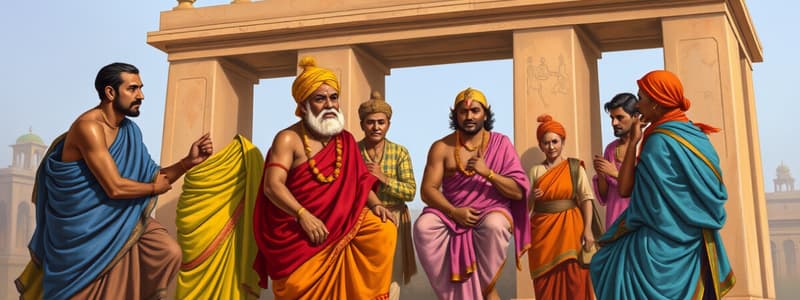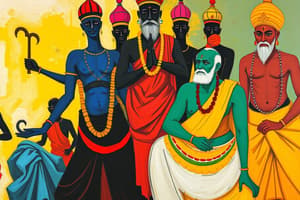Podcast
Questions and Answers
जाति प्रणाली के अनुसार निम्नलिखित में से कौन सी श्रेणियां मुख्य हैं?
जाति प्रणाली के अनुसार निम्नलिखित में से कौन सी श्रेणियां मुख्य हैं?
- समाजवादी, पूंजीवादी, साम्यवादी, धार्मिक
- व्यापारी, श्रमिक, किसान, वैज्ञानिक
- राज्य, संघ, मंत्रालय, परिषद
- ब्राह्मण, क्षत्रिय, वैश्य, शूद्र (correct)
जाति की परिभाषा क्या है?
जाति की परिभाषा क्या है?
- एक राजनीतिक विचारधारा
- एक सामाजिक संरचना जिसमें व्यक्तियों का समूह जन्म से निर्धारित होता है (correct)
- एक धार्मिक अनुष्ठान
- एक अर्थव्यवस्था प्रणाली
किसी जाति का अर्थव्यवस्था से संबंध किस प्रकार है?
किसी जाति का अर्थव्यवस्था से संबंध किस प्रकार है?
- जाति अक्सर विशिष्ट व्यवसायों और भूमिकाओं से जुड़ी होती है (correct)
- समाज के प्रत्येक वर्ग के लिए समान रोजगार के अवसर होते हैं
- जाति का अर्थव्यवस्था पर कोई प्रभाव नहीं होता
- जाति केवल शहरी क्षेत्रों में ही महत्वपूर्ण है
निम्नलिखित में से कौन से समूह वैरना प्रणाली के बाहर माने जाते हैं?
निम्नलिखित में से कौन से समूह वैरना प्रणाली के बाहर माने जाते हैं?
जाति और लोकतंत्र के बीच किस प्रकार का संबंध है?
जाति और लोकतंत्र के बीच किस प्रकार का संबंध है?
जाति आधारित राजनीतिक दलों का उदय किस प्रकार के आंदोलन का परिणाम है?
जाति आधारित राजनीतिक दलों का उदय किस प्रकार के आंदोलन का परिणाम है?
किसी जाति के कानून से संबंधित मुद्दों का क्या अर्थ है?
किसी जाति के कानून से संबंधित मुद्दों का क्या अर्थ है?
आधुनिक समय में जातियों के बीच कौन सा तत्व महत्वपूर्ण है?
आधुनिक समय में जातियों के बीच कौन सा तत्व महत्वपूर्ण है?
Flashcards are hidden until you start studying
Study Notes
Political Science: Caste
Definition of Caste
- A hierarchical social structure in which individuals are born into specific groups.
- Traditionally associated with Hindu society, but also present in other cultures and religions.
Key Characteristics
- Endogamy: Marriage within the same caste.
- Occupation: Historically linked to specific professions and roles.
- Social Status: Determines social standing and access to resources.
Caste System in India
- Varna System: Four primary categories: Brahmins (priests), Kshatriyas (warriors), Vaishyas (merchants), and Shudras (laborers).
- Jati: Sub-categories within Varnas, often based on regional and occupational lines.
- Untouchables: Groups outside the Varna system, historically marginalized and discriminated against.
Political Implications
- Representation: Caste influences political identity and party affiliation.
- Reservation Policies: Affirmative action measures to ensure representation for lower castes in government jobs and educational institutions.
- Social Movements: Rise of caste-based political parties and movements advocating for rights and recognition.
Caste and Democracy
- Vote Bank Politics: Politicians often mobilize support based on caste loyalty.
- Identity Politics: Caste shapes political discourse and electoral strategies.
- Challenges: Caste-based discrimination and inequality continue to affect social cohesion and political stability.
Caste in Global Context
- Present in various forms across different countries (e.g., jati system in Sri Lanka, racial caste in the U.S.).
- Influences social mobility, access to education, and economic opportunities worldwide.
Contemporary Issues
- Urbanization: Changing dynamics of caste in urban settings, with growing inter-caste interactions.
- Digital Activism: Use of social media to challenge caste-based discrimination and mobilize support.
- Caste in Law: Ongoing legal battles concerning caste-based discrimination and rights.
Conclusion
- Caste remains a significant factor in political science, influencing identity, power dynamics, and social justice movements.
- Understanding caste is essential for analyzing political behavior and policies in societies where it plays a role.
जाति परिभाषा
- जाति एक पदानुक्रमित सामाजिक संरचना है जिसमें व्यक्ति विशिष्ट समूहों में जन्म लेते हैं।
- यह पारंपरिक रूप से हिंदू समाज से जुड़ी है, लेकिन अन्य संस्कृतियों और धर्मों में भी मौजूद है।
प्रमुख विशेषताएँ
- अंतर्जातीय विवाह: समान जाति में विवाह करना।
- व्यवसाय: ऐतिहासिक रूप से विशेष पेशों और भूमिकाओं से जुड़ा हुआ है।
- सामाजिक स्थिति: सामाजिक स्थिति और संसाधनों तक पहुँच निर्धारित करता है।
भारत में जाति प्रणाली
- वरना प्रणाली: चार प्राथमिक श्रेणियाँ - ब्राह्मण (पुरोहित), क्षत्रिय (योद्धा), वैश्य (व्यापारी), और शूद्र (श्रमिक)।
- जाती: वर्ना के भीतर उप-श्रेणियाँ, अक्सर क्षेत्रीय और व्यवसायिक आधार पर।
- अछूत: वे समूह जो वरना प्रणाली के बाहर हैं, ऐतिहासिक रूप से हाशिए पर और भेदभाव का शिकार।
राजनीतिक अर्थव्यवस्था
- प्रतिनिधित्व: जाति राजनीतिक पहचान और पार्टी संबद्धता को प्रभावित करती है।
- आरक्षण नीतियाँ: निचली जातियों के लिए सरकारी नौकरियों और शैक्षिक संस्थानों में प्रतिनिधित्व सुनिश्चित करने के लिए सकारात्मक कार्रवाई।
- सामाजिक आंदोलनों: जाति आधारित राजनीतिक दलों और आंदोलनों की वृद्धि जो अधिकारों और पहचान के लिए काम कर रहे हैं।
जाति और लोकतंत्र
- वोट बैंक राजनीति: राजनेता अक्सर जाति निष्ठा के आधार पर समर्थन जुटाते हैं।
- पहचान राजनीति: जाति राजनीतिक संवाद और चुनावी रणनीतियों को आकार देती है।
- चुनौतियाँ: जाति आधारित भेदभाव और असमानता सामाजिक एकता और राजनीतिक स्थिरता को प्रभावित कर रहे हैं।
वैश्विक संदर्भ में जाति
- विभिन्न देशों में विभिन्न रूपों में मौजूद (जैसे, श्री लंका में जाटी प्रणाली, अमेरिका में नस्लीय जाति)।
- सामाजिक गतिशीलता, शिक्षा की पहुँच, और वैश्विक आर्थिक अवसरों को प्रभावित करती है।
समकालीन मुद्दे
- शहरीकरण: शहरी सेटिंग में जाति का परिवर्तित गतिशीलता, अंतर्जातीय इंटरैक्शन की वृद्धि।
- डिजिटल सक्रियता: जाति आधारित भेदभाव को चुनौती देने और समर्थन जुटाने के लिए सोशल मीडिया का उपयोग।
- कानून में जाति: जाति आधारित भेदभाव और अधिकारों को लेकर चल रहे कानूनी संघर्ष।
निष्कर्ष
- जाति राजनीतिक विज्ञान में एक महत्वपूर्ण कारक बना हुआ है, जो पहचान, शक्ति गतिशीलता, और सामाजिक न्याय आंदोलनों को प्रभावित करता है।
- जाति को समझना उन समाजों में राजनीतिक व्यवहार और नीतियों का विश्लेषण करने के लिए आवश्यक है जहाँ यह एक महत्वपूर्ण भूमिका निभाती है।
Studying That Suits You
Use AI to generate personalized quizzes and flashcards to suit your learning preferences.




